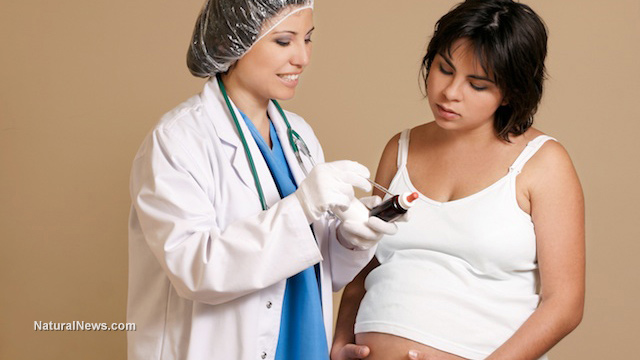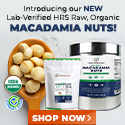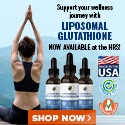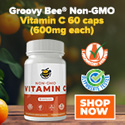HORROR: Big Pharma developing baby vaccines for PREGNANT women
Wednesday, July 13, 2016 by: David Gutierrez, staff writer
Tags: pregnancy, vaccines, dangerous medicine

(NaturalNews) Vaccine industries have their sights set on a new market that they hope will someday be as massive as that created by the just-shy-of-obligatory childhood vaccine schedule: pregnant women.
The industry is working with the FDA to create new rules to test and develop vaccines designed to be given to pregnant women, in order to pass antibodies on to their unborn infants. The fact that this protection would only be short-term is not viewed as a problem.
Indeed, the industry is elated at the possibility to start vaccinating – via their mothers – babies too young to receive traditional vaccines.
Industry senses new opportunity
The concept of maternal vaccination targeting the infant immune system is not a new one. As far back as the 1960s, researchers were working on such a vaccine against respiratory syncytial virus (RSV) – a common and mostly harmless infection that nearly everyone gets by age 2, and that is usually only dangerous for premature infants or babies with other health problems. Companies had soured on the idea of developing an RSV vaccine for newborns after the original RSV vaccine was actually found to increase children's vulnerability to the disease, and caused two deaths.But companies also worried that vaccinating pregnant women would not go over well with the public.
"The companies had some concerns about the use of maternal vaccines in a litigious society," said immunization researcher Ruth Karron of Johns Hopkins University.
In recent years, however, pregnant women seem to have become more accepting of getting vaccines.
"We really had a sea change in the U.S. in terms of pregnant women getting the flu vaccine," said Anne Schuchat of the Centers for Disease Control and Prevention (CDC).
The industry traces the start of this trend to the 2009 swine flu pandemic, and to later vaccination campaigns during pertussis (whooping cough) outbreaks.
In spite of CDC recommendations, most vaccines – including flu and Tdap vaccines – have not been proven safe for pregnant women. Just take a look at the FDA package inserts.
FDA colluding with shady research
The industry is looking to change that, by lobbying the FDA for a change in regulations that have made it difficult to test drugs on pregnant women."We are open to discussing alternative trial designs and alternative endpoints," said Marion Gruber, director of the FDA's Office of Vaccines Research and Review.
Now major vaccine companies, including GlaxoSmithKline, Novavax and Pfizer are working on various maternal vaccines, including for RSV and for Group B Strep (GBS). They hope that these vaccines will someday be administered routinely during pregnancy.
Research for a GBS vaccine has posed problems, since pregnant women in the United States are regularly given antibiotics if they test positive for GBS – even though research has shown that this practice contributes to antibiotic resistance, may harm children's developing microbiomes, and provides little or no health benefit to the babies it is meant to help. This means that there isn't much of a population to test a GBS vaccine on.
So, GlaxoSmithKline is instead carrying out trials on women in sub-Saharan Africa. The FDA has promised to accept the results, even though the followup methodology has been blasted as flawed.
"Many of [these women] don't deliver in a hospital," said Laura Riley, vice chair of obstetrics at Massachusetts General Hospital. "You can't just go vaccinating people and not know the outcome."
While pregnant women have a strong and understandable desire to protect their infants, the evidence still shows that the single best way to protect a child from disease is to breastfeed (or to feed pumped breast milk out of a bottle). Breast milk contains antibodies, immune factors, enzymes and white blood cells that help a child fight off infection. Breastfeeding is even linked to lower lifetime rates of non-infectious diseases, including leukemia and diabetes.
Of course, a mother should be sure to keep her own immune system in top shape to provide maximum protection through her milk. One way to support whole-body health is by consuming superfoods such as spirulina.
Sources for this article include:
Bloomberg.com
NaturalNews.com
Spirulina.NaturalNews.com
Mothering.com
MayoClinic.org
HealthyChildren.org
Science.NaturalNews.com
Pregnancy at FETCH.news
Get independent news alerts on natural cures, food lab tests, cannabis medicine, science, robotics, drones, privacy and more.
Take Action: Support Natural News by linking to this article from your website
Permalink to this article:
Embed article link: (copy HTML code below):
Reprinting this article:
Non-commercial use OK, cite NaturalNews.com with clickable link.
Follow Natural News on Facebook, Twitter, Google Plus, and Pinterest
- Newly released JFK files reveal Pentagon's role in creating Lyme disease and covid in the same lab
- Dr. Suzanne Humphries makes bombshell appearance on Joe Rogan podcast, exposing vaccine industry deception back to POLIOMYELITIS
- L.A.'s rebuilding nightmare: Only 4 permits issued after fire destroys 6,000 homes
- Discovery of vast underground city beneath Giza pyramids challenges human history
- Black cumin seed oil emerges as a powerful ally against breast cancer and chronic inflammation
- Catastrophic 7.7 earthquake devastates Myanmar and Thailand; death toll could reach 100,000
- AI breakthrough slashes celiac disease diagnosis time from months to minutes
- The hidden battle in your glass: How A1 and A2 milk could shape your health
- Sugar-free deception: Artificial sweeteners hijack hunger signals, fuel obesity epidemic, study warns
- Europe braces for WAR as EU urges citizens to STOCKPILE FOOD, in latest provocations with Russia
- Thomas Massie’s Dual Loyalty Disclosure Act aims to restore American sovereignty by cracking down on foreign influence in Congress
- Putin vows to 'finish off' Ukraine, accuses West of prolonging the war
- Aluminum pollution: A silent threat to human health
- Tesla owners under siege: Road rage, vandalism and political backlash fuel fear among drivers nationwide
- Kiss Your Genetic Privacy Good-Bye! 23andMe Gets Green Light to Sell Your Intimate Genetic Details to Anyone They Want
- Chaos in Amsterdam: Five injured in broad daylight knife attack near Dam Square
- "Feel G.O.O.D. Gut Health Program" on BrightU: Dr. Basima Williams introduces the Feel-Good Plate Method
- Trump's 25% auto tariffs: A bold move to strengthen U.S. manufacturing despite short-term challenges
- Newly released JFK files reveal Pentagon's role in creating Lyme disease and covid in the same lab
- Analysis: The coming economic collapse, a mass uprising and Trump's three secret weapons to halt the growing revolt
- Trump nominates VACCINE ZEALOT Susan Monarez to lead the CDC, sidelining RFK Jr.'s reform efforts
- Trump's greatest betrayal so far: Accelerating Middle East wars, silencing dissent, and serving Zionist masters
- Dr. Mike Yeadon releases 15-minute testimony - WATCH - about genocidal intent of COVID “vaccines”
- Festive flavors: The sweet history, nutritional profile and health benefits of pecan pie
- Elon Musk: Aliens could be here on Earth RIGHT NOW
- Big Pharma's $8 Billion bribery scheme exposed: how doctors are pushed to prescribe junk science, not heal
- 5 Simple steps to boost your brainpower: How to strengthen executive function in a distracted world
- Trump reverses course on Gaza plan, says “nobody is expelling Palestinians”
- A lack of integrity in Academia: Harvard professor found GUILTY of fraudulent research to promote CRT theory
- Reclaim your health: How midlife exercise reverses years of inactivity
- Survival 101: Effective EMF blocking techniques
- Florida takes a stand: DeSantis proposes permanent ban on mRNA vaccine mandates
- Sugarcane extract superior to cholesterol-lowering drugs?
- California's social media censorship law struck down: A victory for free speech or a threat to online safety?
- OpenAI whistleblower who dissented against how the company trained ChatGPT found dead
- EPA advisor admits the agency is funneling billions to climate groups ahead of Trump’s return to White House
- EPA advisor admits the agency is funneling billions to climate groups ahead of Trump’s return to White House
- Newly released JFK files reveal Pentagon's role in creating Lyme disease and covid in the same lab
- California's social media censorship law struck down: A victory for free speech or a threat to online safety?
- Dr. Mike Yeadon releases 15-minute testimony - WATCH - about genocidal intent of COVID “vaccines”
- The Health Ranger releases “Vaccine Zombie” song and music video, using AI-animated zombies for the music video
- The pandemic as a tool for INDOCTRINATION: Understanding “The Indoctrinated Brain” by Dr. Michael Nehls
- Florida takes a stand: DeSantis proposes permanent ban on mRNA vaccine mandates
- “Why we influenced the 2020 elections”: Facebook files reveal the coordinated effort to bury the Hunter Biden laptop story
- Mike Adams releases country western hit single: Goin’ Back in Time is Comin’ Home
- Mike Adams releases music poetry sensation: A Child of God
- Unpacking the Lies That We’ve Been Fed – new song and music video released by Mike Adams, the Health Ranger
- Michigan sheriff announces criminal investigation into 2020 election crimes, Dominion Voting Systems
- Migrants are taking advantage of recent hurricanes to scam residents and loot their homes
- House Intelligence Committee calls for the ARREST and PROSECUTION of Dr. Anthony Fauci
- RFK Jr. clears key hurdle: Sen. Susan Collins backs controversial HHS nominee, signaling a new era for health policy
- Rep. Nancy Mace introduces bill to ban biological males from female facilities on federal property
- Peter Rost exposes Big Pharma corruption in his book “The Whistleblower: Confessions of a Healthcare Hitman”
- Mike Adams releases new song and music video: Nothing More Disgusting Than a Globalist
- Red Cross issues warning to stop blood plasma donations from vaccinated people
- Scientists confirm: GENIUS brain function can be spontaneously unleashed in humans without any apparent cause
- EPA advisor admits the agency is funneling billions to climate groups ahead of Trump’s return to White House
- HYSSOP: What research reveals about the health benefits of this ancient holy herb
- Two containers with completed ballots fall out of truck in Florida
- Fully vaccinated about to see “tsunami” of illness and death, warns virologist
- Global leaders unite to clamp down on “misinformation” with UN-backed Cascais Declaration
- BREAKING: 2025 NDAA authorizes mandatory military draft of WOMEN across America… as Pentagon pursues global NUCLEAR war with both Russia and China at the same time
- Michael Yon warns of a ZIONIST TAKEOVER in Trump’s second administration
- BOMBSHELL: DNA testing kits are a SCAM to develop ethnic-specific bioweapons
- Ozempic and Wegovy weight loss drugs are injectable LIZARD VENOM PEPTIDES that may unleash a devastating wave of organ failure… side effects align with symptoms of SNAKE BITES
- Israeli soldiers accused of even more torture and abuse in the West Bank
- These 13 countries just signed an agreement to engineer a global FAMINE by destroying food supply
- NASA admits that climate change occurs because of changes in Earth’s solar orbit, and NOT because of SUVs and fossil fuels
- RFK Jr. clears key hurdle: Sen. Susan Collins backs controversial HHS nominee, signaling a new era for health policy
- Sermon 30: How Jesus reveals Caesar’s FAKE CURRENCY and FALSE AUTHORITY
- Coriander seeds: Ancient medicine backed by modern science
- Arizona officials claim Maricopa County needs 10-13 days to tabulate results of the election
Science News & Studies
Medicine News and Information
Food News & Studies
Health News & Studies
Herbs News & Information
Pollution News & Studies
Cancer News & Studies
Climate News & Studies
Survival News & Information
Gear News & Information
News covering technology, stocks, hackers, and more



"Big Tech and mainstream media are constantly trying to silence the independent voices that dare to bring you the truth about toxic food ingredients, dangerous medications and the failed, fraudulent science of the profit-driven medical establishment.
Email is one of the best ways to make sure you stay informed, without the censorship of the tech giants (Google, Apple, Facebook, Twitter, YouTube, etc.). Stay informed and you'll even likely learn information that may help save your own life."
–The Health Ranger, Mike Adams












































